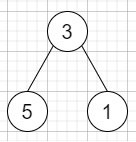
 Data Structure
Data Structure Networking
Networking RDBMS
RDBMS Operating System
Operating System Java
Java MS Excel
MS Excel iOS
iOS HTML
HTML CSS
CSS Android
Android Python
Python C Programming
C Programming C++
C++ C#
C# MongoDB
MongoDB MySQL
MySQL Javascript
Javascript PHP
PHP
- Selected Reading
- UPSC IAS Exams Notes
- Developer's Best Practices
- Questions and Answers
- Effective Resume Writing
- HR Interview Questions
- Computer Glossary
- Who is Who
Path Sum IV in C++
Suppose we have a list of integers that is representing a binary tree with a depth smaller than 5. If the depth of a tree is less than 5, then this tree can be represented by a list of three-digit integers. For each integer in this list −
The hundreds digit is representing the depth D of this node, 1 <= D <= 4.
The tens digit is representing the position P of this node in the level it belongs in the range, 1 to 8. The position is the same as that in a full binary tree.
The units digit is used to represent the value V of this node, 0 <= V <= 9.
We have to find the sum of all paths from the root towards the leaves.
So, if the input is like [113, 215, 221], then the output will be 12, The tree that the list represents is

The path sum is (3 + 5) + (3 + 1) = 12.
To solve this, we will follow these steps −
Define one map graph
Define a function dfs(), this will take node, level, pos, sum initialize it with 0,
isLeaf := true
-
for initialize i := 0, when i < size of graph[level + 1], update (increase i by 1), do −
Define one pair temp := graph[level + 1, i]
-
if temp.first / 2 is same as pos, then −
isLeaf := false
dfs(temp.second, level + 1, temp.first, sum + node)
-
if isLeaf is non-zero, then −
ret := ret + (sum + node)
From the main method do the following,
ret := 0
-
for initialize i := 0, when i < size of nums, update (increase i by 1), do −
x := nums[i]
val := x mod 10
x := x / 10
pos := x mod 10
x := x / 10
level := x
insert { (shift 1 left side (level - 1) times), val } at the end of graph[level]
dfs(graph[1, 0].second, 1, graph[1, 0].first)
return ret
Example
Let us see the following implementation to get better understanding −
#include <bits/stdc++.h>
using namespace std;
class Solution {
public:
int ret;
map <int, vector < pair <int, int> > > graph;
void dfs(int node, int level, int pos, int sum = 0){
bool isLeaf = true;
for (int i = 0; i < graph[level + 1].size(); i++) {
pair<int, int> temp = graph[level + 1][i];
if (temp.first / 2 == pos) {
isLeaf = false;
dfs(temp.second, level + 1, temp.first, sum + node);
}
}
if (isLeaf) {
ret += (sum + node);
}
}
int pathSum(vector<int>& nums) {
ret = 0;
for (int i = 0; i < nums.size(); i++) {
int x = nums[i];
int val = x % 10;
x /= 10;
int pos = x % 10;
x /= 10;
int level = x;
graph[level].push_back({ (1 << (level - 1)) + pos - 1, val });
}
dfs(graph[1][0].second, 1, graph[1][0].first);
return ret;
}
};
main(){
Solution ob;
vector<int> v = {113,215,221};
cout<<(ob.pathSum(v));
}
Input
{113,215,221}
Output
12

